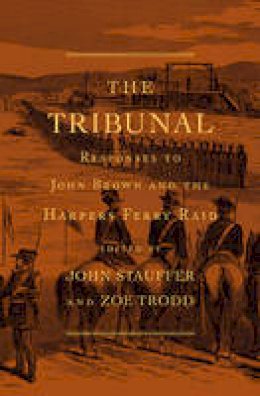
Stock image for illustration purposes only - book cover, edition or condition may vary.
The Tribunal: Responses to John Brown and the Harpers Ferry Raid
John Stauffer
€ 71.61
FREE Delivery in Ireland
Description for The Tribunal: Responses to John Brown and the Harpers Ferry Raid
Hardback. This landmark anthology collects speeches, letters, newspapers, journals, poems, and songs to demonstrate that John Brown's actions at Harpers Ferry altered the course of history. Without Brown, the Civil War probably would have been delayed by four years and emancipation movements in Brazil, Cuba, even Russia might have been disrupted. Editor(s): Stauffer, John; Trodd, Zoe. Series: The John Harvard Library. Num Pages: 640 pages, 1 halftone, 2 line illustrations. BIC Classification: 1KBB; 3JH; HBAH; HBJK; HBLL. Category: (G) General (US: Trade). Dimension: 237 x 166 x 49. Weight in Grams: 1052.
When John Brown led twenty-one men in an attack on the federal arsenal at Harpers Ferry on October 16, 1859, he envisioned a biblical uprising of millions of armed bondsmen, thus ridding the nation of the scourge of slavery. The insurrection did not happen, and Brown and the other surviving raiders were quickly captured and executed. This landmark anthology, which collects contemporary speeches, letters, newspaper articles, journals, poems, and songs, demonstrates that Brown's actions nonetheless altered the course of American history. John Stauffer and Zoe Trodd have assembled an impressive and wide-ranging collection of responses to Brown's raid: Brown's own words, northern and southern reactions, international commentary, and reflections from the Civil War and Reconstruction era. Represented here are all the figures one would expect to see (Lincoln, Thoreau, Frederick Douglass), many surprises (John Wilkes Booth, Karl Marx, Giuseppe Garibaldi), as well as free and enslaved blacks and white citizens. The result is a book that views Brown from multiple vantage points. The Introduction describes the panic that Harpers Ferry created in the South, splitting the Democratic Party along sectional lines and altering the outcome of the 1860 presidential election. Without Brown, it speculates, the Civil War and emancipation would have been delayed by another four years-probably more-which in turn might have disrupted emancipation movements in Brazil, Cuba, and even Russia. The Tribunal is essential reading for anyone interested in the Civil War era and the history of social protest movements.
Product Details
Publisher
Harvard University Press United States
Number of pages
640
Format
Hardback
Publication date
2012
Condition
New
Weight
28g
Number of Pages
640
Place of Publication
Cambridge, Mass., United States
ISBN
9780674048850
SKU
V9780674048850
Shipping Time
Usually ships in 7 to 11 working days
Ref
99-1
About John Stauffer
John Stauffer is Professor of English, of American Studies, and of African and African American Studies, Harvard University. He is the author of Giants: The Parallel Lives of Frederick Douglass and Abraham Lincoln. Zoe Trodd is Professor of American Literature at the University of Nottingham.
Reviews for The Tribunal: Responses to John Brown and the Harpers Ferry Raid
No one is likely to have the last word on John Brown, the abolitionist and leader of the 1859 Harpers Ferry raid that cut to the marrow of the slavery question and convinced many Southerners that the North had gone mad and wanted to incite slave rebellion. However, this superb collection of documents comes very close to doing so. In the wide sweep of texts collected here
150 speeches, editorials, letters to editors, pamphlets, poems, songs, and more, each neatly set in historical context by the editors
Northerners, Southerners, and foreign commentators are shown to be, in Frederick Douglass's phrase, both curious and contradictory in weighing the meaning of John Brown and his act. The documents display a mixture of awe and anger, hope and horror, at the man, especially after he went bravely to the gallows proclaiming the justice of his cause. And, as the documents further attest, Brown and his raid remained contentious in history and myth thereafter...To understand the power of conviction and the crisis of fear that brought on civil war, reading this brilliant collection is essential. From it, one will see that John Brown is not a-moldering in his grave. He haunts us yet today.
Randall M. Miller Library Journal (starred review) 20120901
150 speeches, editorials, letters to editors, pamphlets, poems, songs, and more, each neatly set in historical context by the editors
Northerners, Southerners, and foreign commentators are shown to be, in Frederick Douglass's phrase, both curious and contradictory in weighing the meaning of John Brown and his act. The documents display a mixture of awe and anger, hope and horror, at the man, especially after he went bravely to the gallows proclaiming the justice of his cause. And, as the documents further attest, Brown and his raid remained contentious in history and myth thereafter...To understand the power of conviction and the crisis of fear that brought on civil war, reading this brilliant collection is essential. From it, one will see that John Brown is not a-moldering in his grave. He haunts us yet today.
Randall M. Miller Library Journal (starred review) 20120901
